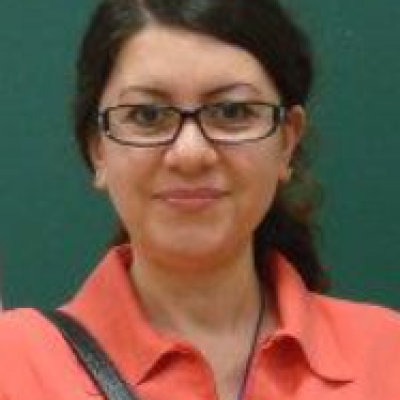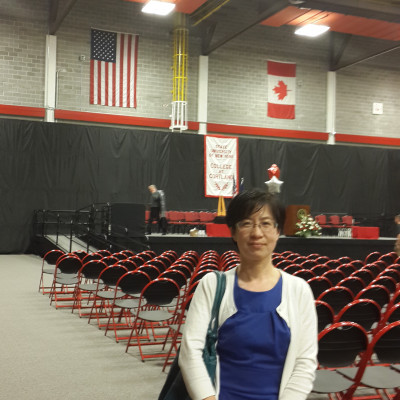Sessions / Location Name: Saturday
Virtual Location
Virtual: You cannot enter virtually via this page. Click on the titles of individual presentations or go to the Live Page
Recipe for a National Extensive Reading Program #3285
Permission to Record
The Avenue project has been working towards raising awareness of extensive reading as a means of supporting language learners in the settlement sector across Canada. As this venture is gaining momentum, we have identified essential characteristics of a large scale, cohesive extensive reading program. In this session we will share these attributes with examples from the Avenue project. We will also share an update of our progress towards building a national extensive reading system.
Designing an Extensive Reading Website to Enhance Intercultural Communication Abilities and Global Competence #3241
This study will report how an extensive reading (ER) website (https://lchineseer.sites.pomona.edu) was designed and constructed for learners of Chinese as a foreign language. A complete review of existing ER websites was first conducted to draw insights on website features and functions. A needs-analysis was conducted among a group of L2 Chinese learners to examine their reading needs. Based on the reading needs, over 300 reading passages on different aspects of Chinese culture were adapted or adopted. The reading passages were categorized based on number of words, readability levels, and topics. How to use the website to improve intercultural communication abilities will also be discussed.
Reading in an electronic age: ER without graded readers #3316
Join the breakout room for a discussion on Reading in an electronic age and ER without graded readers.
The effects of extensive reading on JFL learners’ reading rates and comprehension #3211
Research into the effects of extensive reading (ER) has surged over the past few decades. However, many of these studies are limited by their lack of control over how the ER treatment is conducted. Furthermore, experimental and quantitative studies that investigate the possible effects of ER on the reading skills of learners of Japanese have yet to be fully explored. The goal of this study was to investigate the possible effects of ER on the reading rate development and comprehension abilities of learners of Japanese as a foreign language (JFL). Using a quantitative single-case study method, eight intermediate learners of Japanese were monitored while they engaged in ER and strictly adhered to ER principles over 2.5 to 4 months. Results showed that participants’ reading rates increased significantly following the monitored ER treatment and that comprehension abilities were not hampered by an increase in reading rate. Pedagogical implications will be discussed.
Extensive reading and critical reading skills and in the EFL classroom #3184
This action research study, conducted with 13 eleventh grade students from a public school in Piedecuesta, Colombia, was focused on establishing how the implementation of an Extensive Reading technique in the EFL learning school context contributed to the development of critical reading skills in L2. Diagnostic tests, video recordings, teacher’s journal and students’ diaries, and posttests were used as instruments to gather information to determine any improvement. The results revealed the positive impact ER had in the classroom to foster students’ reading process. In such a way, the participants demonstrated the use of different reading strategies to deal with texts, and the teacher-researcher reflection upon her pedagogical praxis during pandemic collected valuable information of the remote educational processes and its difficulties.
Is Audio-assisted Extensive Reading Better Than Extensive Reading or Listening Alone? #3205
Previous Extensive Reading (ER) studies almost exclusively focus on English language learners and tend to be limited by their lack of control over how the ER treatment is conducted and assessed. Furthermore, studies that investigate the possible effects of different styles of ER, including Extensive Listening (EL) and Audio-assisted Extensive Reading (AER), are few. The goal of this study was to investigate the possible effects of monitored ER, EL, and AER on the general proficiency development of learners of Japanese as a foreign language (JFL). Using an experimental design, data collection for the first year of this three-year project (currently including data from 92 elementary and intermediate JFL learners) has been completed. First-year results indicate that all treatment groups outperformed the control group, and the AER and ER groups had higher gain scores than the EL group. Pedagogical implications, future directions, and the current impact will be discussed.
Extensive reading, grammar, and the language teacher #3215
Much has been said and written about the benefits of ER for language learning, and vocabulary gains through ER have often been investigated. Vocabulary knowledge is obviously important; it is, for example, regarded as the single greatest predictor of comprehension. Vocabulary is also essential for communication for, as was said fifty years ago: “while without grammar very little can be conveyed, without vocabulary nothing can be conveyed”. Yet, while vocabulary gains have received much attention, learning grammar through ER has been largely overlooked. In this talk, I want to focus on the problems that unfamiliar grammatical constructions can cause in ER, and the grammar learning that is possible from ER. I will be doing this with examples from my own experience as a French language learner (not that you will need to know French to understand the examples!). After considering the extent to which grammar learning is possible, I will then discuss how the language teacher and other forms of instruction can facilitate this learning. The talk will suggest gaps in our current knowledge and so will conclude with some thoughts about future research directions.
AWL + ER = AWL Readers #3243
Permission to Record
Given the importance of learning L2 vocabulary in context (Webb, 2008), the use of academic texts would seem to be one of the most useful ways to support the learning of academic vocabulary. However, authentic academic materials rarely have sufficient academic vocabulary range and frequency to provide for the learning of the academic vocabulary. In addition, authentic materials tend to be too difficult for all but advanced level students. Against this background, the presenter wrote a fictional graded reader series (‘The AWL Readers’) in an attempt to make the learning of English academic vocabulary in context more effective, more comprehensible, and more stimulating for the students.
The AWL Readers follow the adventures (and misadventures) of a fictional university student and her unusual friend. They include all 570 AWL words, most recycled multiple times. This presentation will discuss: (1) how and why the AWL Readers were created; (2) how they will be used at the presenter’s institution; and (3) their possible usefulness in other teaching and learning contexts.
Classroom issues #3317
Join the breakout room for a discussion on Classroom issues.
The impossible dream achieved: Introducing a coursebook for Extensive Reading #3268
Many language teachers implement Extensive Reading in their classes in the knowledge that it will benefit learners’ language development. However, it can be difficult to create entire courses around ER, and some institutions require a compulsory textbook for each course. This presentation describes the development (and completion) of a four-skills coursebook seamlessly integrating an ER program through Xreading.com. The book is designed with a task-based approach and features engaging and relevant topics for learners.
Stories with Local Content To Instill Cultural Awareness in Young Language Learners #3173
When young learners are finally able to read their own books in the target language learned, it definitely is not merely an instant process of alphabet recognition or spelling. Long before the day arrives, they should have been enduring a process which should be a complete discovery of meaning and cultural values in which they are brought upon. It is linear to Ki Hajar Dewantara—Indonesian’s Father of Education—strong belief that exposure to dolanan (game), tembang (song/chant), drama or play, dongeng (stories) with local and culturally rich content are ideal tools to facilitate young learners. This practice-based findings reveal cultural value awareness and immersion as learners are exposed to poster stories, puppet show stories, children pictorial books, and articles with local content. Several methods applied and discussed are: reading aloud, story telling, comparing and analyzing cultural values within stories and learners’ local culture, and also opinion giving.
The case for agenda-based literature circles in EFL contexts #3282
Second language Literature Circles (L2-LCs) are useful as a way to help students onboard to ER. However, in the post-pandemic era, traditional face-to-face classrooms are but one setting for managing second language (L2) extensive reading (ER). Due to the variety of new contexts, an agenda-based system is suggested as an alternative to role-based LCs. Agenda-based meetings are authentic, intuitive for inexperienced teachers, and logistically simple. Agenda-based worksheets simultaneously scaffold learners’ responses to a reading during the reading phase and provide a plan for sharing learners’ inner experience with ER for students and teachers alike. This presentation aims to elucidate relevant pedagogical stylistic features of L2-LCs and show how teachers can quickly and easily develop worksheets in the agenda-based format. The addition of a separate pre-discussion stage for learners to focus on language and facilitation skills makes L2-LCs more effective for supporting simultaneous orientation to ER and building self-efficacy for discussion.
Reading and English Language Learning: Perceptions of University Students #3180
The aim of the study was to investigate a group of Thai university students’ perceptions of reading and English language learning. Twenty-eight students participated in two sessions of online discussions. The first was their responses to the question on the best way to learn English and the second was on their favorite language skill. The data collection was done in January 2022 and it was the online learning context. It was found that reading was not found to be the best way to learn English. As for their favorite skill, reading was the favorite skill of eight students (29%). About one-third of the students said their favorite skill was reading, but the majority of them did not see reading as the best way to learn English. The findings suggest the need to promote and cultivate reading habits among adult learners, especially university students to embrace both intensive and extensive reading.
How to do Extensive reading with few resources and no money #3279
Join the breakout room to ask and answer questions. Please watch the video before joining the session. The presenter will be available to take questions about any of the topics brought up in the video. Participants will also have chances to add their own ideas.
How to create free, interactive, high-quality EL/ER materials for any level #3305
This presentation will look at how teachers and educators can create high-quality extensive reading materials that can also work for extensive listening. Attendees will learn how to create graded readers by recording natural speech in the form of narrations, stories, and interviews. The presentation will then show how to use various free tools, such as Canva, PowerPoint and Google slides to transform audio into engaging and even interactive audio books and lessons. In addition, teachers will learn how students can create works of art to share with other students around the world. Lastly, the presentation will briefly show how educators can crowd source creation by recording audio and video of people (friends, family, coworkers, etc.) around the world and then transforming it into extensive reading and listening materials, particularly graded readers.
The Impact of Extensive Reading by Applying Two Reading Sites to Improve Learners’ Lexical Knowledge for Reading Comprehension #3287
Drawing on the benefits of Krashen’s comprehension hypothesis (2003) and compelling input hypothesis (2018), Ellis’ “implicit learning without conscious awareness” (2008) and Grabe’s “long-term and large volumes of input” (2009), extensive reading (ER) has been found beneficial to develop the learners' comprehension. This study investigated the impact of extensive reading of two reading sites, BBC English learning and British Council Learning English on high school EFL learners. This study examined if ER facilitated target learners’ lexical and cultural knowledge to develop reading comprehension. Learners of the treatment group (n = 35) and control group (n = 35) received instruction with ER and without ER, respectively, for six months by adopting two International English Language Testing System (IELTS) tests. The mixed-method paradigm triangulated the data to gauge changes in them. The result showed that treatment group learners outperformed the control group, which is statistically significant and implied incorporating the extensive reading as an extra-curricular.
Integrated Dictionary Usage During Online Extensive Reading (Xreading) and its Effect on the Use of Reading Strategies #3286
The ability to guess meaning from context is a valuable skill for developing vocabulary knowledge. Although during extensive reading, dictionaries are typically not used, the new integrated dictionary in Xreading allows learners to immediately access definitions as they read. This research is investigating the effect that this online integrated dictionary usage has on the learner's ability to guess from context.
Lounge and Reception #3307
Meet participants and prepare for the day.





















